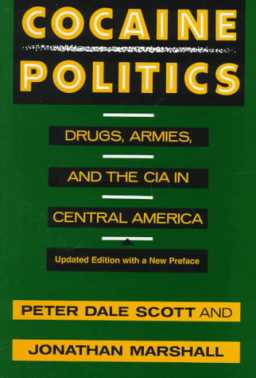Peter Dale Scott and Jonathan Marshall
University of California Press, Cambridge (UK) 1991, £8.95.
The basic rule of politics, domestic and international is that my enemy’s enemy is my friend. That rule ensured that the CIA adopted as allies the opium growers of the Golden Triangle in the 1960s and 70s, and the heroin producing mujahadeen of Pakistan and Afghanistan in the 80s. The ostensible ‘enemy’ was communism in one guise or another. But if you look at the destruction wreaked on the American cities by the drug explosions caused by American foreign policy ‘friends’, the enemy also appears to have been the urban American poor, especially the black sections of it.
To the surprise of no-one who had read, say, Alfred McKoy’s The Politics of Heroin in South East Asia, exactly the same thing happened, for exactly the same reasons, when the Reagan administration set about destroying the Sandinista regime. It was simplicity itself: planes flew from America carrying supplies for the CIA’s contra army camped along the Nicaraguan border, and flew back to America carrying cocaine. The authors note in their preface to this second edition, ‘Our conclusion remains that the first target of an effective drug strategy should be Washington itself, and specifically its own connections with corrupt, drug-linked forces in other parts of the world.’
The peculiar American twist to this sequence of events has been the accompanying noisy, utterly futile, ‘wars’ on drugs. As Edward Herman’s book (reviewed in this issue) would have it, this is beyond hypocrisy. It’s rather as if the Nazis had simultaneously spent tens of millions of pounds preaching racial tolerance and cultural diversity while stuffing the ovens.
Building on the courageous (but largely ignored) investigation by Senator John Kerry’s terrorism and narcotics subcommittee into the contra-cocaine-CIA connections, the authors pile up layer after layer of further evidence of those links. The result is a dense, massively documented indictment of U.S. foreign policy. There is no comparable work being done in this country. For one of the paradoxes of the contemporary U.S is that alongside the mind-boggling corruption, stupidity and hypocrisy of its policies, there is a tradition of openness in its political culture which is unimaginable in this declining island. The point is this: Scott and Marshall have put together this incredible indictment from existing, published sources. Everything from Congressional inquiries to underground newspapers have been ransacked for the fragments which have been assembled into this wonderful piece of research.
